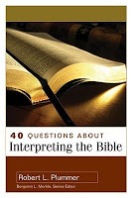If we are good Bible readers, we aren’t content to simply read the Bible, we want to do what it says. We aren’t content to simply interpret it, we want to apply it as well. However, sometimes we can be so eager to apply the Bible that we don’t take the time to interpret it. We can be so eager to be doers, that our ability to be good readers suffers.
We must be hearers and doers, in that order. Bible reading isn’t a craft where we can cut corners. Quickly finding an application, when not built on the foundation of interpretation, can cause problems. In fact, a hasty application can cause us to miss the entire point of a passage. In some cases it can even cause us to work against the point of the passage.
Take for instance, Matthew 5:1-26
You have heard that it was said to those of old, ‘You shall not murder; and whoever murders will be liable to judgment.’ But I say to you that everyone who is angry with his brother will be liable to judgment; whoever insults his brother will be liable to the council; and whoever says, “You fool!” will be liable to the hell of fire. So if you are offering your gift at the altar and there remember that your brother has something against you, leave your gift there before the altar and go. First be reconciled to your brother, and then come and offer your gift. Come to terms quickly with your accuser while you are going with him to court, lest your accuser hand you over to the judge, and the judge to the guard, and you be put in prison. Truly, I say to you, you will never get out until you have paid the last penny.
A Hasty Application A quick glance at this passage reveals that anger and resentment are the common theme. The subtitles in our Bibles confirm this. The ESV, for instance, chose anger as their subtitle, the NASB chose personal relationships, and the NIV chose murder. All of these subtitles raise the suspicion that this passage is about how we should treat others. If we stop there, assuming that the subtitles did our job for us, we are likely to assume that the passage is written to encourage us to be less angry and more loving. Our application will sound something like this: “Don’t get angry with people and don’t speak poorly about them, instead try to be more loving.”
A quick glance at this passage reveals that anger and resentment are the common theme. The subtitles in our Bibles confirm this. The ESV, for instance, chose anger as their subtitle, the NASB chose personal relationships, and the NIV chose murder. All of these subtitles raise the suspicion that this passage is about how we should treat others. If we stop there, assuming that the subtitles did our job for us, we are likely to assume that the passage is written to encourage us to be less angry and more loving. Our application will sound something like this: “Don’t get angry with people and don’t speak poorly about them, instead try to be more loving.”
Consider the Context
This short passage is the first of several instances in chapter five where Jesus takes a law that the people were familiar with and intensifies it. To understand each of these it is helpful to remember how he introduced the section. Jesus explains in Matthew 5:17-20,
Do not think that I have come to abolish the Law or the Prophets; I have not come to abolish them but to fulfill them. For truly, I say to you, until heaven and earth pass away, not an iota, not a dot, will pass from the Law until all is accomplished. Therefore whoever relaxes one of the least of these commandments and teaches others to do the same will be called least in the kingdom of heaven, but whoever does them and teaches them will be called great in the kingdom of heaven. For I tell you, unless your righteousness exceeds that of the scribes and Pharisees, you will never enter the kingdom of heaven.
Jesus is setting up a fact that we don’t often like to consider. The Law is hard. He explains that his coming doesn’t make it any easier. To make his point he puts forward a shocking claim. He essentially says, consider the most righteous person you know, consider someone who has dedicated their entire life to knowing the laws and to taking serious steps toward keeping them, you would have to be far more righteous than that person if you want any hope of getting into heaven.
Anger as an Example of Our Trouble
Because this claim seems so over the top, Jesus gives some examples to help make it more clear. The first one is this text dealing with anger. Jesus makes two points here to drive the message home.
First, Jesus explains that keeping the law is harder than we think. In Matthew 5:21-22 Jesus shows us exactly what he means by not relaxing the Law. If you thought not murdering was enough to keep the commandment, you misunderstood the commandment. Instead, to keep this commandment we have to keep from being angry. Just as murder, even one murder, was enough to condemn us as a murder, anger, even just one time, is enough to send us to hell. The prospect is scary because even though most people had never murdered, everyone, even the Pharisees, are guilty of anger.
But perhaps this is were the Pharisees thought they were prepared. Sure they have been angry, but they have offered sacrifices to cover that sin. They offered burnt offerings to cover their guilt. Yet, in Matthew 5:23-24, Jesus makes his second point by calling the sacrifices into question. If they thought that their burnt offerings would cover their sins, they were wrong. Instead Jesus says to forget the burnt offerings, first go and make everything right. In fact, giving a burnt offering, or going to worship, when there is anger in our hearts is the most dangerous thing we could do.
We may wonder why it would be dangerous to worship, or offer a sacrifice, when we are angry. To clarify, Jesus offers a little story. He compares the sacrifice to going before a judge, and cautions that whenever you stand before the judge, you are liable to be judged. And when you stand before a righteous judge he will not let you go until you have paid the last penny. Only a fool would go before the judge while there is still guilt on his hands.
As we consider this message we realize that this is not meant to encourage us to be more loving, it is meant to scare the socks off of us. If we simply tried to be more loving, when would we ever be loving enough to enter into His courts? How good is good enough? Jesus himself answers that question in the last verse of the chapter. “You therefore must be perfect, as your heavenly Father is perfect (Matthew 5:48).
A Better Application
When we consider the argument that Jesus is making, it becomes clear that any effort to be more loving misses the boat. It’s not that we shouldn’t be more loving, but that we must realize that we can never be loving enough to get into heaven. Worse, we have been so angry that we deserve hell and that no amount of effort, including offering sacrifices, worship, or in our modern context, going to church, can help.
So how do we apply a passage like this? Do we simply get depressed at our own failures? That may be a good start, Jesus does introduce the entire sermon with “Blessed are the poor in spirit.” However, that isn’t going far enough. We must remember that though Jesus did not come to abolish the Law, he did come to fulfill it. As Jesus’ conclusion to this sermon reminds us, our efforts to get to heaven can be built on one of two foundations. The foolish option is to build on the sandy foundation of our own ability to do good and avoid anger. The wise man, however, will choose to stand on the firm foundation of Jesus. Though we cannot fulfill the Law on our own, Jesus did so on our behalf.
If we apply this passage too quickly, if we try to be doers without considering the heart of the message, we run the risk of doing the very thing Jesus is cautioning us of. We can never get to heaven by trying to be better. We can never know God on the basis of our own good deeds. Instead we must despair of our own ability and cling ever more tightly to the only one who has ever fulfilled the Law. It is only on his shoulders that we can ever enter the kingdom of heaven.










